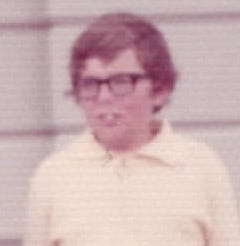I probably sang nursery rhymes as a child. If I did, I can’t remember. I do know that I was in the choir at school when I was 10 or 11 years old and in 4th or 5th grade. I remember this for two reasons. The first reason was that everyone in the class was in the choir. It was kind of a mandatory thing so when we had our annual recital for parents, friends and families, no one was left out. I also remember this because we weren’t very good. In fact, we were awful.
Our teacher couldn’t really figure it out but something was making us sound horribly off key. Finally, on the verge of giving up she had one last plan. She would call on us one by one, to come into a different classroom and sing solo for her.
One by one kids went into the room and kids came out of the room none the wiser. All was good, they said. Everything was going smoothly. Then it was my turn.
I have no idea what song she asked me to sing or how far I got before she stopped me. She heaved a huge sigh of relief. She had finally found the noise that was giving her spine-tingling, eardrum-splitting spasms. This gave her so much relief that she was almost happy with me. She certainly wasn’t upset. All she said was:
“Paul, from now on you can stand where you’re supposed to stand in the choir. You can stand straight and tall. (I was more round than straight and more fat than tall, but no mind). You can open your mouth wide and move your lips all you want. Just don’t let any sounds come out of your mouth. Please. No sound.”
After me, I don’t even think she had anyone else come in and do the solo audition. She had found the string that was out of tune and she knew that it couldn’t be tuned so she removed it. Oh, it was still visible in the choir, but it was silenced.
That was the end of my song career. I don’t think I was traumatised by the experience. I was probably happy to not have to sing even though I still went to choir practice every week.
(Slight diversion here. When I was 17, “choir practice” took on a whole new meaning after some of us read Joseph Wambaugh’s book “The Choirboys”. I was a noisy, happy voice at those choir practices, but that’s another story….)
Instead of singing at choir practice, I did what I did (do) best. I daydreamed. Mostly about hockey probably. Even though I had been enrolled in accordion lessons and later would be playing the trumpet in the City Band, my music interest was waning from low to non-existent. Then, still while I was only 12 or 13, Glenn Yarborough came to town and changed my life.
My mother had tickets and took me to his concert in the local community theatre. Did I want to go? I don’t know. Was I her first choice? I don’t know. Did I have any idea who Glenn Yarborough was? I doubt it.
One of the first songs I can remember him singing that night had a refrain that went something like:
That's OK, Rose would say Don't you worry none, We'll have good times by and by Next Fall when the work's all done.
I’ve tried to find it on Spotify, but I can’t find a Glenn Yarborough version. Google tells me it’s a Rod McKuen song. In any case, if it didn’t change my life completely when I was 12 years old, it certainly planted some seeds that still bloom in my head today.
Even if you’ve never heard it, you can probably guess what happens in that old folk song. It shouldn’t really be a spoiler to you if I tell you that before “next Fall”, even before the end of the song, poor Rose becomes ill and dies. The song told a story, a sad story, and it had a moral, or a lesson if you will. Don’t put off till tomorrow what you can do today.
But that’s not the lesson the song or the evening taught me. What I learned that night, that had somehow evaded my conscious mind previously, was that songs tell stories. They can tug at your emotions. They can make you laugh. They can make you cry. They can make you clap. (In my case, I clapped out of synch with the music and the rest of the audience, prompting my mother to use the same tactic as my choir teacher had used. She told me to let the others clap, and not to let my two hands touch each other if I wanted to clap along.)
Glen Yarborough introduced me to the storytelling of songs and was inspirational when I started writing poetry a couple of decades later. My poems rhyme, they tell stories and sometimes they have a lesson to teach.
I never could sing, but thanks to Glen Yarborough, deep down inside, I always knew I had a voice.
Thanks for reading 87 Stories - Lessons from the University of Life!
I’m Paul, and I like to say that my post-high school gap year in Europe, included a 30-year, basement-to-boardroom career at a company that didn’t want to hire me.
Written with the clarity of hindsight, the accuracy of a faded memory and countless creative liberties, 87 Stories is a journal of how my gap year lasted four decades, made me an emigrant, an immigrant and a gave me a life I never dreamed of.
Stay safe, Always Care





